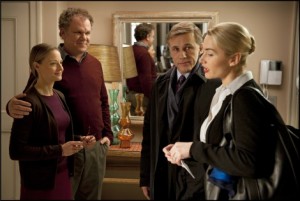REVIEW: New ‘Carnage’ is less than godly

God of Carnage, the exquisite play by Yasmina Reza, was a sensation when it played Broadway a couple years ago. James Gandolfini, Jeff Daniels, Marcia Gay Harden and Hope Davis worked their way through an evening of theatrical calisthenics that proved to be hilarity incarnate.
Like so many theater-to-film adaptations, the four-person story doesn’t translate well to the silver screen. Roman Polanski’s 79-minute Carnage, which recently opened in New York City and Los Angeles, seems too light and trite to work similar wonders. Reza, who wrote the script with Polanski, has pulled some punches and generally dampened much of the fury. All in all, the film is a quasi-bore that only intermittently gains the momentum and enjoyment of the original text.
Penelope (Jodie Foster) and Michael Longstreet (John C. Reilly) are shocked to find out that their son has been whipped across the head with a tree branch by a fellow student. Rather than bringing the lawyers and second opinions into the altercation, the Longstreets decide to act in a most civil manner: They invite the offender’s parents over for some coffee and chatting.
Enter Nancy (Kate Winslet) and Alan Cowan (Christoph Waltz). They are equally concerned over the incident and willing to take full responsibility.
What starts as a conversation of even tempers and mild manners soon escalates into a full-out brawl among these four seemingly reserved people.
Penelope will not allow the incident to be brushed aside, while her husband is more forgiving and conciliating.
Nancy turns queasy anytime a fight breaks out, while Alan can’t stop talking on the phone with his assistants at a big pharmaceutical company.
Much like the way their children fought at the playground, the Cowans and Longstreets turn into veritable beasts and attack each other’s failings and sensitivities.
On stage, the heightened drama of the proceedings led to many humorous altercations. Flowers went flying. Vomit went spewing. I’m pretty sure some fists may have even flew.
In the movie, Polanski dulls down everything, and this causes the conversations and occurrences to be more believable, but also less interesting. If these characters are never going to have at it, then what’s the point of observing them? Yes, the director picks up on some nice subtle moments that could be lost on a grand Broadway stage. But it doesn’t sustain the audience’s interest, even for the measly 79 minutes.
I appreciated Waltz’s entire approach to the Alan character. Right from the beginning, he creeps his way into the Longstreet’s abode, never caring about his manners or politeness.
Foster, too, has some genuinely great moments in the film. Her character is very much the “tribal leader,” the one willing to say what’s on her mind. She’s perpetually on the road to catharsis.
Reilly is affable and probably the funniest of the bunch. He’s like an “every man” stuck in the middle of a painfully absurd display of political correctness. Winslet, surprisingly, doesn’t add much to the comedy. She never carves out enough of the character, and her late-stage drunkenness feels oddly forced.
Carnage should have been a film that emphasizes our innate animalistic tendencies and proclivity for fighting (even as reasoned adults). Instead, Polanski has created a fleeting extended conversation that ends right where it began: nowhere.
This is not to say that the Oscar-winning director doesn’t achieve a beautiful intimacy. One of the difficulties of theater is to convey facial emotions without the aid of closeups. In film, a director can get much closer to his creations and demand they offer their genuineness to the audience. Polanski does this with Carnage, letting his restrained shots linger and acquire resonance.
Polanski has fun with the film, which doesn’t feature any other prominent characters except these two couples. He enjoys snaking his way around the Brooklyn apartment where the action takes place, inspecting its bookcases and finding the depth in the proper decor.
But Carnage can’t be simply about the setting, or even the characters. If it doesn’t say something deeper about the human condition, then it’s merely an experiment with a few laughs throw in for good measure. Unfortunately, the god of carnage trips up on his way from stage to screen.
By John Soltes / Publisher / John@HollywoodSoapbox.com-
Carnage
-
2011
-
Directed by Roman Polanski
-
Written by Polanski and Yasmina Reza; based on Reza’s play, God of Carnage
-
Starring Kate Winslet, Jodie Foster, John C. Reilly and Christoph Waltz
-
Running time: 79 minutes
-
Rated R for language
-
Rating:





